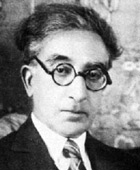A Greek poet, published only about 200 privately printed poems. Cavafy has come in recent years to be regarded as a the greatest Mediterranean poet of modern times.
He who longs to strengthen his spirit
must go beyond obedience and respect,
He will continue to honor some laws
but he will mostly violate
both law and custom.
(from 'Strengthening the Spirit', 1903)
Constantine P. Cavafy was born Konstantinos Petrou Kavafis (or Kabaphs) in Alexandria, Egypt, into a wealthy merchant family. Originally the family came from Constantinople, Turkey, where Cavafy lived from 1880 to 1885. After his father's death in 1872 he was taken to Liverpool, England, for five years. Apart from the years in Istanbul (1882-85), he spent the rest of his life in Alexandria. "Whatever war-damage it's suffered,however much smaller it's become, it's still a wonderful city," Cavafy once wrote of his cosmopolitan home town - perhaps not without ironic attitude. When the family's prosperity declined, Cavafy worked 34 years intermittently as journalist, broker, and in the Irrigation Service, from which he retired in 1922.
Enjoying his family's respectable position in the cosmopolitan society of Alexandria, Cavafy led an uneventful life of routine, which was interrupted only by short trips to Athens, France, England, and Italy. His first book was published when he was 41, and reissued five years later with additional seven poems. He published no further works during his lifetime.
As a writer Cavafy was perfectionist - he printed his poems by himself and delivered them only to close friends. The poems had sometimes handwritten corrections. Main themes in his works were homosexual love, art, and politics. He started writing poetry under the influence of late-Victorian and Decadent European models, but then abandoned his attempts to compose in foreign tongues.
Fourteen of Cavafy's poems appeared in a pamphlet in 1904. The edition was enlarged in 1910. Several dozens appeared subsequent years in a number of privately printed booklets and broadsheets. These editions contained mostly the same poems, first arranged thematically, and then chronologically. Close to one third of his poems were never printed in any form while he lived. 'One Night,' written 1907, was one of the erotic poems Cavafy wrote during the years in Alexandria, and referred to a passing sexual encounter. It showed the poet's devotion to a sensual pleasure, free and joyous.
In book form Cavafy's poems were first published without dates before World War II and reprinted in 1949. PIIMATA (The Poems of Constantine P. Cavafy) appeared posthumously in 1935 in Alexandria. Cavafy died on April 29, 1933 in Alexandria. Nowadays the cafés that the poet frequented on the Rue Misalla (now Safiya Zaghlul) have been largely replaced by shops.
"What is shocking about Cavafy's writing is the absence of Mediterranean or eastern imagery... He was cut off from the Arabic and Islamic world, and his eastern side is suspended." (Marguerite Yourcenar in The Atlas of Literature, 1996)
Cavafy composed rhymed as well as free verse, but never loose, unstructured, or irregular poems. He used iambic, eleven-syllable measures, including the popular fifteen-syllable verse of the demotic tradition. After giving up experiments with different literary models, Cavafy mixed the demotic and pure Greek called katharevousa, and used his wide knowledge of the history of East Roman and Byzantine empires as the basis of his themes. In 'The God Abandon's Anthony' he used Shakespeare's play Anthony and Cleopatra and Plutarch's Life of Anthony to describe sense of loss through the fictive voice of an unknown person who addresses Mark Anthony:
Like in Oscar Wilde, aestheticism and skepticism marked Cavafy's work. One of his central motifs was regret for old age: "You will not find other places, you will not find other seas. The city will follow you. All roads you walk will be these roads. And you will age in these same neighborhoods; and in these same houses you will go gray." (from 'The City') Past and present, East and West, Greek and 'barbarian' were fused into sophisticated commentaries on paganism, Christianity, and decadent modern world. Cavafy sketched a rich gallery of historical, semiobscure, or fictitious characters, whom he used as personae acting, or being discussed, in the episodes of his poems. Often his style was dramatic, as in the famous 'Waiting for the Barbarians.' Among his confessional poems with homosexual theme is 'The Bandaged Shoulder,' much admired by Lawrence Durrell.
Cavafy's poems have been translated into English, French, Italian, and German, and several other languages. The 1963 Nobel laureate George Seferis was his ardent admirer, E.M. Forster persuaded T.S. Eliot to publish several Cavafy's lyrics in The Criterion in 1924. The English novelist John Fowles has remarked that Cavafy is for him the great poet of the Levant. |






